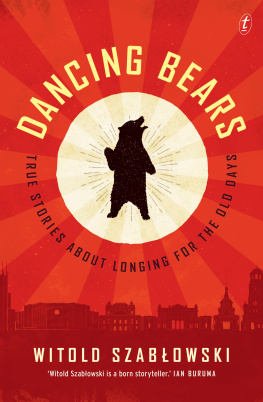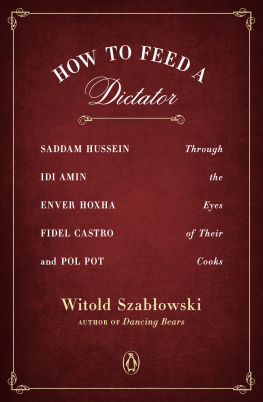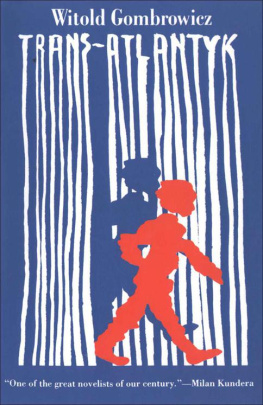Witold Gombrowicz - Ferdydurke
Here you can read online Witold Gombrowicz - Ferdydurke full text of the book (entire story) in english for free. Download pdf and epub, get meaning, cover and reviews about this ebook. year: 2000, publisher: Yale University Press, genre: Art. Description of the work, (preface) as well as reviews are available. Best literature library LitArk.com created for fans of good reading and offers a wide selection of genres:
Romance novel
Science fiction
Adventure
Detective
Science
History
Home and family
Prose
Art
Politics
Computer
Non-fiction
Religion
Business
Children
Humor
Choose a favorite category and find really read worthwhile books. Enjoy immersion in the world of imagination, feel the emotions of the characters or learn something new for yourself, make an fascinating discovery.

- Book:Ferdydurke
- Author:
- Publisher:Yale University Press
- Genre:
- Year:2000
- Rating:4 / 5
- Favourites:Add to favourites
- Your mark:
- 80
- 1
- 2
- 3
- 4
- 5
Ferdydurke: summary, description and annotation
We offer to read an annotation, description, summary or preface (depends on what the author of the book "Ferdydurke" wrote himself). If you haven't found the necessary information about the book — write in the comments, we will try to find it.
Ferdydurke — read online for free the complete book (whole text) full work
Below is the text of the book, divided by pages. System saving the place of the last page read, allows you to conveniently read the book "Ferdydurke" online for free, without having to search again every time where you left off. Put a bookmark, and you can go to the page where you finished reading at any time.
Font size:
Interval:
Bookmark:

Witold Gombrowicz
Ferdydurke
Translated from the Polish by Danuta Borchardt
Foreword by Susan Sontag
1938 Translation copyright 2000
Contents
Foreword Susan Sontag
Start with the title. Which means... nothing. There is no character in the novel called Ferdydurke. And this is only a foretaste of insolence to come. Published in late 1937, when its author was thirty-three, Ferdydurke is the great Polish writer's second book. The title of his first, Memoirs of a Time of Immaturity (1933), would have served beautifully for the novel. Perhaps this is why Gombrowicz opted for jabberwocky.
That first book, whose title was pounced on by the Warsaw reviewers as if Gombrowicz had made a shaming confession inadvertently, was a collection of stories (he'd been publishing them in magazines since 1926); over the next two years more stories appeared, including a pair ("The Child Runs Deep in Filidor" and "The Child Runs Deep in Filibert") that he would use, with chapter-long mock prefaces, as interludes in Ferdydurke, as well as a first play, Princess Ivona; then, in early 1935, he embarked on a novel. Had the title of his volume of fanciful stories seemedhis word"ill-chosen"? Now he would really provoke. He would write an epic in defense of immaturity. As he declared toward the end of his life:
"Immaturitywhat a compromising, disagreeable word!became my war cry."
Immaturity (not youth) is the word Gombrowicz insists on, insists on because it represents something unattractive, something, to use another of his key words, inferior. The longing his novel describes, and endorses, is not, Faust-like, to relive the glory days of youth. What happens to the thirty-year-old who, waking up one morning roiled in the conviction of the futility of his life and all his projects, is abducted by a teacher and returned to the world of callow schoolboys, is a humiliation, a fall.
From the start, Gombrowicz was to write, he had chosen to adopt a "fantastic, eccentric, and bizarre tone" bordering on "mania, folly, absurdity." To irritate, Gombrowicz might have said, is to conquer. I think, therefore I contradict. A young aspirant to glory in 1930s literary Warsaw, Gombrowicz had already become legendary in the writers' cafs for his madcap grimaces and poses. On the page, he sought an equally vehement relation to the reader. Grandiose and goofy, this is a work of unrelenting address.
Still, it seems likely that Gombrowicz did not know where he was going when he began the novel. "I can well remember," Gombrowicz declared in 1968, a year before he died (did he remember? or was he massaging his legend?), that, when I started Ferdydurke, I wanted to write no more than a biting satire that would put me in a superior position over my enemies. But my words were soon whirled away in a violent dance, they took the bit between their teeth and galloped towards a grotesque lunacy with such speed that I had to rewrite the first part of the book in order to give it the same grotesque intensity.
But the problem was less (I suspect) that the first chapters needed a further infusion of lunatic energies than that Gombrowicz did not anticipate the freight of argumentabout the nature of eros, about culture (particularly Polish culture), about idealshis tale would carry.
Ferdydurke starts with a dreamlike abduction to an absurd world, in which the big become small and the small monstrously big: those great buttocks in the sky. In contrast to the landscape Lewis Carroll conjured up for a prepubescent girl, Gombrowicz's wonderland of shape-shiftings and re-sizings seethes with lust.
Everything was expanding in blackness. Inflating and widening, yet at the same time shrinking and straining, evading something, and some kind of winnowing, general and particular, a coagulating tension and a tensing coagulation, a dangling by a fine thread, as well as transformation into something, transmutation, and furthermorea falling into some cumulative, towering system, and as if on a narrow little plank raised six stories up, together with the excitement of all organs. And tickling.
In Alice's story, a child falls into an asexual underworld governed by a new, fantastic but implacable logic. In Ferdydurke, the grownup who is turned into a schoolboy discovers new, puerile freedoms for giving offense and owning up to disreputable desire.
Starts with an abduction; ends with an abduction. The first (by Professor Pimko) returns the protagonist to the scene of true, that is, unmanageable, feeling and desire. The second abduction shows the protagonist making a provisional flight back into so-called maturity.
If someone were to spot me in the hallway, in the darkness, how would I explain this escapade? How do we find ourselves on these tortuous and abnormal roads? Normality is a tightrope-walker above the abyss of abnormality. How much potential madness is contained in the everyday order of thingsyou never know when and how the course of events will lead you to kidnap a farmhand and take to the fields. It's Zosia that I should be kidnapping. If anyone, it should be Zosia, kidnapping Zosia from a country manor would be the normal and correct thing to do, if anyone it was Zosia, and not this stupid, idiotic farmhand...
Ferdydurke is one of the most bracing, direct books ever written about sexual desirethis without a single scene of sexual union. To be sure, the cards are stacked from the start in favor of eros. Who would not concur in the silencing of this social babble by the clamor of rumps, thighs, calves? The head commands, or wishes to. The buttocks reign.
Later, Gombrowicz referred to his novel as a pamphlet. He also called it a parody of a philosophical tale in the manner of Voltaire. Gombrowicz is one of the super-arguers of the twentieth century "To contradict, even on little matters," he declared, "is the supreme necessity of art today"and Ferdydurke is a dazzling novel of ideas. These ideas give the novel both weight and wings.
Gombrowicz capers and thunders, hectors and mocks, but he is also entirely serious about his project of transvaluation, his critique of high "ideals." Ferdydurke is one of the few novels I know that could be called Nietzschean; certainly it is the only comic novel that could be so described. (The affecting fantasia of Hesse's Steppenwolf seems, in comparison, riddled with sentimentality.) Nietzsche deplored the ascendancy of slave values sponsored by Christianity, and called for the overthrowing of corrupt ideals and for new forms of masterfulness. Gombrowicz, affirming the "human" need for imperfection, incompleteness, inferiority... youth, proclaims himself a specialist in inferiority. Swinish adolescence may seem a drastic antidote to smug maturity, but this is exactly what Gombrowicz has in mind. "Degradation became my ideal forever. I worshipped the slave." It is still a Nietzschean project of unmasking, of exposing, with a merry satyr-dance of dualisms: mature versus immature, wholes versus parts, clothed versus naked, heterosexuality versus homosexuality, complete versus incomplete.
Gombrowicz gaily deploys many of the devices of high literary modernism lately re-labeled "post-modern," which tweak the traditional decorums of novel writing: notably, that of a garrulous, intrusive narrator awash in his own contradictory emotional states. Burlesque slides into pathos. When not preening, he is abject; when not clowning, he is vulnerable and self-pitying.
An immature narrator is some sort of candid narrator; even one who flaunts what is usually hidden. What he is not is a "sincere" narrator, sincerity being one of those ideals that make no sense in the world of candor and provocation. "In literature sincerity leads nowhere... the more artificial we are, the closer we come to frankness. Artificiality allows the artist to approach shameful truths." As for his celebrated
Next pageFont size:
Interval:
Bookmark:
Similar books «Ferdydurke»
Look at similar books to Ferdydurke. We have selected literature similar in name and meaning in the hope of providing readers with more options to find new, interesting, not yet read works.
Discussion, reviews of the book Ferdydurke and just readers' own opinions. Leave your comments, write what you think about the work, its meaning or the main characters. Specify what exactly you liked and what you didn't like, and why you think so.









